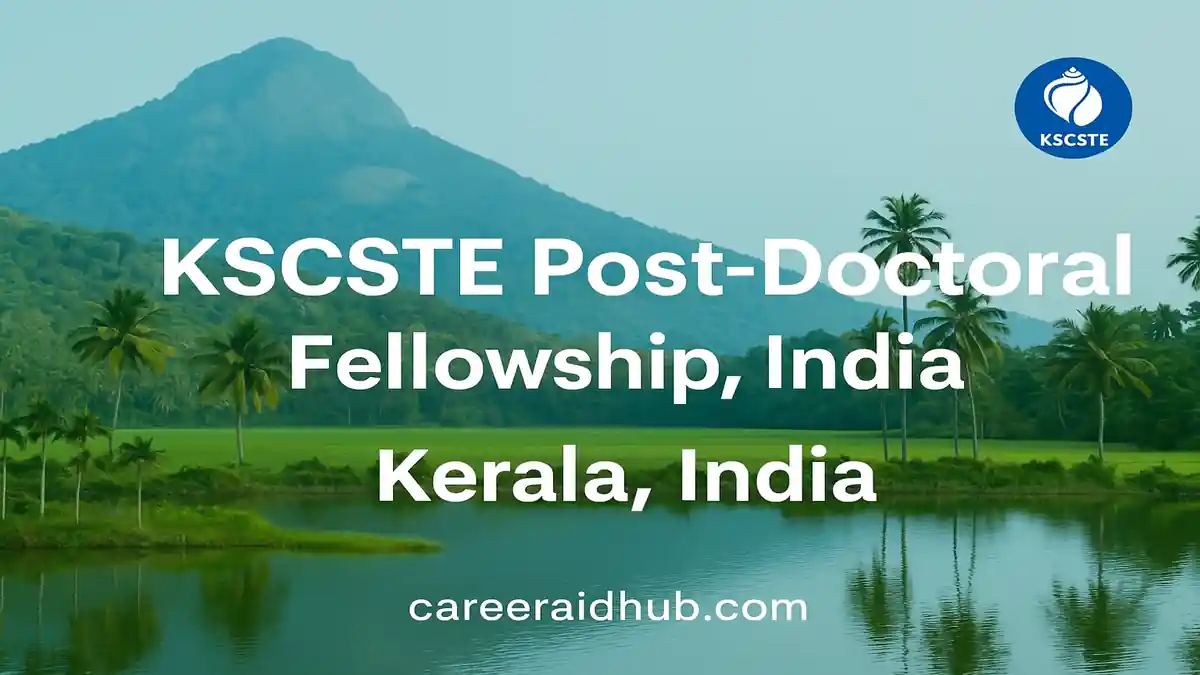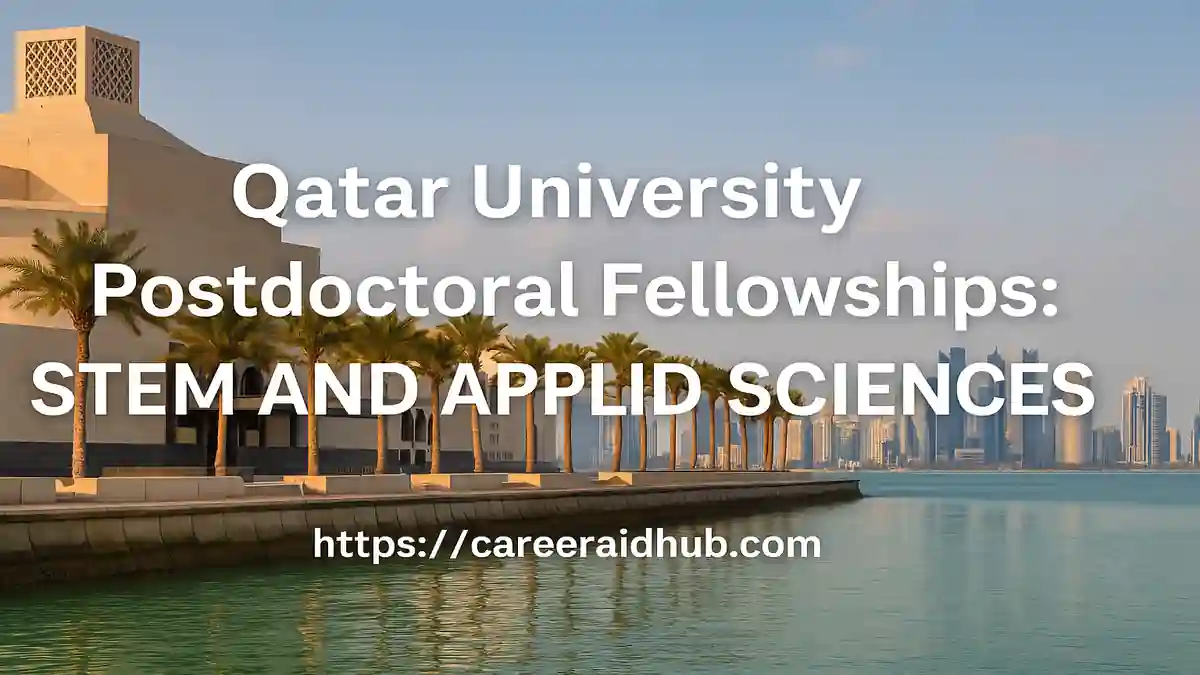What is the KSCSTE Post-Doctoral Fellowship?
The KSCSTE Post-Doctoral Fellowship (PDF) Programme is a key initiative of the Kerala State Council for Science, Technology and Environment. It aims to support outstanding PhD holders in Science and Engineering. In addition, it serves as a structured bridge between doctoral work and an independent research career, especially for those planning a long-term academic or R&D path in India.
The KSCSTE Post-Doctoral Fellowship (PDF) is a prestigious state-funded programme that supports talented early-career researchers from Kerala to pursue advanced work in science and engineering. It offers competitive funding, structured mentorship and a clear pathway toward impactful academic, industrial, translational and innovation-driven research careers in India and abroad.
Core Objectives of the Programme
The scheme has three main goals. First, it aims to strengthen research aptitude in Science and Technology. It encourages talented Ph.D. holders to build on their doctoral work, deepen expertise, and tackle complex, long-term research questions.
Next, it seeks to promote full-time research careers. By offering a competitive state-funded fellowship and strong institutional support, the programme motivates early-career researchers to stay in academia or high-end R&D instead of shifting too early to non-research paths.
Finally,
Host Institution Requirement
Fellows must carry out their work at an eligible host institution within India, and the host centre cannot be the same as the candidate’s Ph.D. institution. Typically, the following types of institutions qualify:
-
- Premier national institutions such as IITs, IISc, IISERs and similar research-intensive institutes
- State-level R&D institutions and government research centres
- University departments with strong research credentials and active Ph.D. programmes
- Selected private R&D organisations that meet KSCSTE’s accreditation and research-activity criteria (for example, recognised research status, NIRF ranking, funded projects and qualified faculty)
This requirement ensures that the fellow is exposed to a new institutional culture, broader professional networks and, in many cases, more advanced research infrastructure and collaborative opportunities.
Fellowship Value and Duration
The KSCSTE PDF is deliberately positioned as a financially attractive state-level postdoctoral fellowship in India so that early-career scientists can focus fully on research without facing constant financial uncertainty.
Financial Support Structure
Selected fellows currently receive a monthly fellowship of ₹60,000 (consolidated). In addition, they get an annual contingency grant of ₹75,000 for
Compared to many state-funded fellowships, this support is more competitive and closer to early-career scientist or senior PDF levels. Therefore, it is especially appealing to high-performing candidates from Kerala seeking a serious, research-focused postdoctoral role.
Grant Release and Continuation
Grants are released to the Head of the Host Institution through electronic transfer. Typically:
-
- The first-year grant is released along with the sanction order once the formal agreement is completed.
- The second-year grant is released only after:
- Submission and approval of the annual progress report, and
- Submission of the Statement of Expenditure (SE) and Utilisation Certificate (UC) for the first year, and
- Evidence of at least one SCI/Scopus publication or a secured patent based on the work carried out in the first year.
This performance-linked funding mechanism encourages fellows to plan their work carefully, publish in a timely manner and use funds responsibly throughout the two-year KSCSTE postdoctoral fellowship period.
Who Can Apply? – Eligibility Criteria
The fellowship is specifically designed for early-career researchers from Kerala who have
Domicile and Residency Requirements
-
Domicile
- The applicant must be a permanent resident of Kerala.
- Appropriate proof of domicile (such as certificates issued by competent authorities) is required at the time of application to the KSCSTE Post-Doctoral Fellowship.
Academic Eligibility
-
Educational Qualification
- A Ph.D. in Science or Engineering must be fully awarded by the time of application. Provisional status or thesis submission alone is generally not sufficient.
- Candidates must have obtained at least 60% marks at the postgraduate level (or an equivalent CGPA as per the relevant university norms).
These academic filters ensure that only candidates with a solid academic foundation and research training progress to the KSCSTE PDF stage.
Age Limits and Relaxation
-
Age Limit
- For the 2025–26 cycle, the upper age limit is 40 years as on 1 January 2025.
- Relaxation in the upper age limit is provided as per state norms:
- OBC candidates: Relaxation of 3 years
- SC/ST candidates: Relaxation of 5 years
This age band aligns with the
Employment Status and Prior Fellowships
-
Employment Status & Previous Fellowships
- The applicant should not be a permanent employee in any institution or organisation at the time of application.
- Candidates who have already availed any Post-Doctoral Fellowship from KSCSTE or any other funding agency are not eligible. This prevents duplication and ensures that new applicants can benefit from state-funded opportunities.
Publication and Intellectual Property Requirements
-
Publications / Patent
- Applicants must have at least one research paper in an SCI-indexed journal or must have secured a patent.
- This requirement serves as a quality filter and signals that the candidate has already contributed new knowledge or technology at a level visible to the national or international scientific community.
Kerala Affiliation and Subject Categories
-
Kerala Affiliation & Subject Areas
- Applicants must be from Kerala but may work at eligible research centres anywhere in India under the KSCSTE postdoctoral scheme.
- The fellowship seats are distributed across four broad subject categories:
- Earth & Atmospheric Sciences
- Engineering Sciences
- Life Sciences
- Physical, Chemical & Mathematical Sciences
Prospective applicants should align their research proposal with one of these categories and ensure that their chosen host centre has adequate facilities and expertise in the relevant discipline.
Host Institution and Scientist Mentor
A distinctive strength of the KSCSTE PDF is its structured mentorship model, which combines institutional infrastructure with close guidance from an experienced scientist or faculty member.
Choosing an Eligible Host Research Centre
Applicants must first identify:
- An eligible Host Research Centre, which:
- Must not be the same as the Ph.D. research centre.
- Is preferably located in Kerala, although premier national institutions elsewhere in India are also considered.
- Should ideally be a government, national or state-level R&D institution, or a well-established university department with active Ph.D. programmes and strong research output.
- In the case of private institutions, the organisation must satisfy KSCSTE’s mandatory requirements such as registration, relevant accreditation, minimum research output and availability of qualified faculty and facilities.
Careful selection of the host institution has a direct impact on the fellow’s productivity, access to equipment, collaboration opportunities and long-term professional visibility.
Role and Profile of the Scientist Mentor
Each applicant must also secure:
- A Scientist Mentor, who:
- Is a regular/permanent faculty member or scientist of the host institution.
- Holds a Ph.D. in Science or Engineering in a relevant area.
- Has at least five years of service remaining before superannuation, ensuring continuity of mentorship throughout the fellowship period.
- Is willing to guide the fellow in planning the research, resolving technical challenges, developing collaborations and shaping outputs such as publications and patents.
- Shares responsibility for timely submission of progress reports, SE/UC, and related administrative documents associated with the KSCSTE postdoctoral project.
From a practical standpoint, applicants should speak to prospective mentors early, review their recent publications and ongoing projects, and ensure strong thematic alignment between the mentor’s research group and the proposed work.
Selection Process: Rigorous and Merit-Based
KSCSTE follows a multi-layered, merit-driven selection process to identify the most promising postdoctoral proposals and to maintain transparency in decision-making.
“text-align: justify;”>Stage 1: Preliminary Scrutiny
- Preliminary Scrutiny
- All applications are first checked for completeness and basic eligibility.
- Missing documents, incorrect formats or clearly ineligible profiles may lead to rejection at this stage.
- Applicants should therefore follow the checklist carefully and avoid last-minute submissions to the KSCSTE PDF portal. </ul>
Stage 2: Technical Evaluation by Experts
- Peer Review by Subject Experts
- Eligible proposals undergo rigorous technical evaluation by domain experts in the relevant field.
- Each proposal is typically assessed on scientific merit, originality, feasibility, relevance to Kerala and national priorities, and alignment with the chosen subject category.
- Proposals are scored on a 10-point scale, and the final ranking is based on the average of the best three scores.
- Only those crossing the discipline-specific cut-off move to the next level, which makes the scheme genuinely competitive among Kerala postdoctoral fellowships. </ul>
le=”text-align: justify;”>Stage 3: Programme Advisory Committee (PAC)
- Presentation before Programme Advisory Committee (PAC)
- Shortlisted candidates are invited to present their research proposal before the PAC.
- This interaction allows the committee to evaluate scientific clarity, presentation skills, feasibility and the candidate’s understanding of methodology and expected outcomes.
- Based on the presentation and expert deliberations, the PAC recommends proposals for funding under the KSCSTE Post-Doctoral Fellowship. </ul></ul>
Stage 4: Agreement and Sanction
- Agreement & Sanction Order
- Selected candidates must sign an agreement with KSCSTE confirming their acceptance of the terms and conditions of the PDF scheme.
- After completion of formalities, the sanction order is issued and the first instalment of the grant is released to the host institution.
This multi-step process ensures that funded projects are scientifically robust, feasible within two years and aligned with broader societal and environmental needs in Kerala and beyond.
How to Apply – Step-by-Step
For the 2025–26 call, applications must be submitted online through the dedicated KSCSTE portal. The most recent announcement indicates that the application deadline falls in December 2025, and applicants should always reconfirm the latest deadline on the official website before applying.
<h3 style=”text-align: justify;”>>Step 1: Study the Official Guidelines Thoroughly
- Read the Official Guidelines
- Download and carefully read the latest PDF Guidelines and notifications for the 2025–26 cycle from the official KSCSTE website.
- Pay particular attention to eligibility conditions, host institution requirements, scoring criteria and document formats.
- This step greatly reduces the risk of technical rejection and helps you align your proposal with evaluation expectations for the KSCSTE PDF. </ul>
Step 2: Identify Host Institution and Mentor
- Identify Host Institution and Mentor
- Shortlist one or more eligible research centres with expertise in your proposed area of work.
- Contact a potential Scientist Mentor at your preferred centre, share a concise concept note and seek their willingness to supervise your project.
- Once they agree, obtain their consent in the prescribed format provided in the downloads section of the KSCSTE website.</li> </ul>
ass=”yoast-text-mark”>yle=”text-align: justify;”>Step 3: Prepare a Strong Research Proposal
- Prepare Research Proposal
- Complete the “Research Proposal – Technical Information” form in the official format.
- Clearly outline:
- Background and rationale
- Objectives and specific research questions
- Methodology and work plan with timelines
- Expected outcomes such as publications, patents, datasets or technology prototypes
- Relevance to Kerala’s development, sustainable development goals or national S&T priorities
- Use clear, concise scientific language and avoid overly ambitious claims that cannot reasonably be addressed within the two-year KSCSTE postdoctoral fellowship duration. </ul>
yle=”text-align: justify;”>Step 4: Compile Documents for Upload
- Compile Required Documents for Upload
As per current guidelines, you will typically need:
-
- Recent photograph and proof of date of birth
- Proof of permanent residency in Kerala
- Postgraduate mark list and degree certificate
- Ph.D. degree certificate
- Work and research experience certificates (if applicable)
- Biodata of the applicant (usually up to 2 pages, focusing on academic record, research experience and publications)
- Biodata of the Scientist Mentor (up to 2 pages, highlighting research interests and major outputs)
- Completed Research Proposal – Technical Information
- List of publications in the prescribed format
- Declaration by the applicant
- Consent from Scientist Mentor
- Endorsement from the Head of Host Institution
- Additional declarations and annexures for private host institutions, where required
Candidates are advised to keep scanned copies in clearly labelled folders before starting the online application process for the KSCSTE PDF scheme.
Step 5: Complete Online Submission
- Online Submission
- Register on the KSCSTE online application portal using the “Click here to apply” link provided on the fellowship page.
- Fill in personal, academic and project details carefully.
- Upload all required documents in the specified formats and sizes.
- Review each section before final submission, as some portals do not allow editing after submission.
- Submit the application well before the final week to avoid server congestion or last-minute technical issues.
Expert Tips for a Strong Application
-
- Align your proposal with current themes highlighted in Kerala’s science, technology and innovation policies, as well as climate, sustainability and public health priorities.
- Demonstrate how your past work (Ph.D. research and publications) logically leads to the proposed postdoctoral project under KSCSTE.
- Where relevant, show potential for collaboration with industry, other institutions or government agencies.
- Consider cross-referencing national schemes or databases (e.g., myScheme portal listing for the KSCSTE Post-Doctoral Fellowship) to understand how this programme is positioned among other fellowships in India.
Final Outputs, Publications and Kerala Science Congress
In addition, fellows must:
-
- Submit a Final Technical Report (FTR), completion report, consolidated SE and UC, and an updated list of publications at the end of the fellowship.
- Ensure at least one SCI/Scopus-indexed publication or a patent emerges from the project before completion. Only after this requirement is fulfilled are the last three months of the second-year fellowship and the second-year contingency fully released.
- Participate in the Kerala Science Congress (as presenter or participant) and submit proof of participation along with final documents. This enhances visibility and embeds the fellow’s work within the state’s research ecosystem.
Failure to maintain satisfactory progress, submit reports on time or deliver expected outputs can lead to delayed grant release or, in severe cases, termination of the fellowship.
Positioning Yourself Beyond the Fellowship
If you are a Kerala-based Ph.D. holder in Science or Engineering with at least one SCI publication or a patent, and you are serious about building a sustained research career, this fellowship can serve as:
-
- A launchpad for applying to faculty positions in universities and institutes in India and abroad.
- A stepping stone toward national fellowships such as SERB, DBT or DST schemes that support early-career faculty and independent investigators.
- A strong credential when competing for international postdoctoral opportunities, especially when combined with publications arising from your KSCSTE-funded work.
Prospective applicants can also benchmark this fellowship against other programmes using reliable aggregators and official portals (such as myScheme and national scholarship directories) to understand where it fits in the broader Indian and global funding landscape.
Final Thoughts
The KSCSTE Post-Doctoral Fellowship is more than a financial grant. Instead, it offers a structured ecosystem that drives early-career researchers toward scientific excellence, social impact, and leadership. Through rigorous selection, strong mentorship, performance-linked funding, and platforms like the Kerala Science Congress, it also builds a pipeline of scientists ready to contribute to Kerala’s and India’s science and technology landscape.
Before you apply, it is prudent to:
-
- Read the latest KSCSTE notifications and guidelines carefully.
- Choose your host institution and mentor strategically, with an eye on facilities, networks and long-term opportunities.
- Align your proposal with both scientific depth and societal impact, especially in areas such as sustainability, climate resilience, healthcare and digital innovation.
Key Programme Snapshot
|
Feature |
Details |
|
Program Name |
KSCSTE Post-Doctoral Fellowship (PDF) Programme |
|
Host Country |
India (research to be carried out at eligible institutions within India) |
|
Funded By |
Kerala State Council for Science, Technology and Environment (KSCSTE), Government of Kerala |
|
Duration |
Up to 2 years (with only exceptional, unfunded extension possible for 6 months) |
|
Study Mode |
Full-time, in-person research at an approved host institution |
|
Eligibility |
Ph.D. in Science/Engineering, permanent resident of Kerala, strong academic and publication record |
|
Financial Support |
₹60,000 per month (consolidated fellowship) + ₹75,000 annual contingency grant |
|
Fields of Study |
Earth & Atmospheric Sciences; Engineering Sciences; Life Sciences; Physical, Chemical & Mathematical Sci. |
|
Deadline |
Current cycle: December 2025 (online submission); next cycle expected around May–June 2026 – will update soon |
|
Official Website |
Click here |
References
Kerala State Council for Science, Technology and Environment – Research Fellowships
Frequently Asked Questions (FAQs)
The KSCSTE Post-Doctoral Fellowship supports permanent Kerala residents with PhDs in science or engineering to pursue full-time, two-year research projects at approved institutions in India with competitive funding.
Additionally, eligible applicants hold a PhD in science or engineering, score at least 60% in post-graduation, reside permanently in Kerala and meet age, publication and employment conditions.
The KSCSTE PDF currently provides a consolidated fellowship of ₹60,000 per month, plus an annual contingency grant of ₹75,000 managed through the host institution.
First, you apply online through the KSCSTE portal, upload all required documents, submit your research proposal and secure consent from your scientist mentor and host institution before the deadline.
Yes, you may select exceptional national institutions outside Kerala, such as IITs, IISc or IISERs, provided they meet KSCSTE host-centre requirements and differ from your PhD institution.
Typically, the KSCSTE Post-Doctoral Fellowship runs for up to two years, and the programme generally does not extend beyond this maximum tenure.
Yes, you must produce at least one SCI or Scopus-indexed publication, or secure a patent from the project, to receive the second-year instalments in full.
Yes, it significantly strengthens your academic CV through funded research, quality publications, patents, mentoring and conference visibility, which helps you compete for faculty and scientist positions.
Premium Mentorship for a Stronger Application
- Premium Mentorship: personalised 1:1 guidance for this and similar opportunities
- In-depth review of your CV, academic profile, and key statements
- Aligned with international selection criteria so your profile matches what panels expect
- Stronger, more compelling narrative for highly competitive calls
- Step-by-step support from opportunity mapping to final submission (fee-based)










